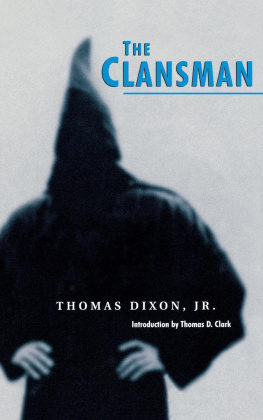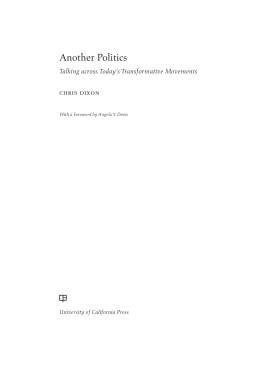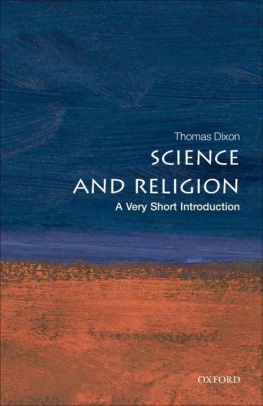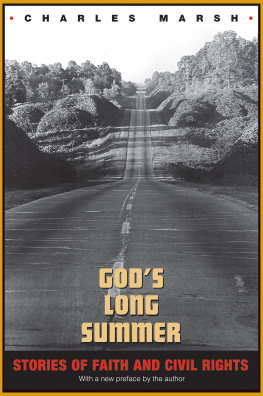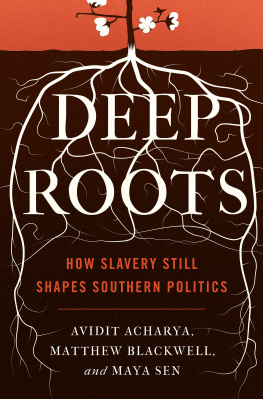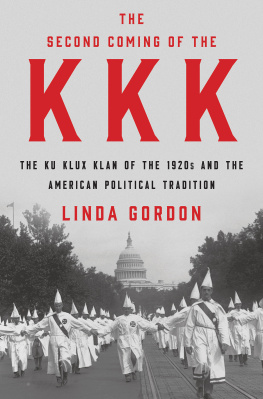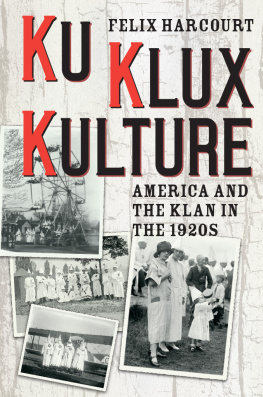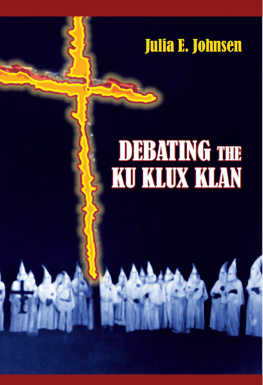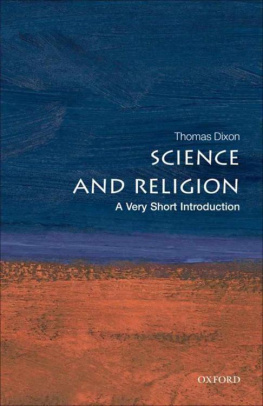THE CLANSMAN
THE CLANSMAN
AN HISTORICAL ROMANCE
OF THE KU KLUX KLAN
BY
THOMAS DIXON, JR.
INTRODUCTION BY
THOMAS D. CLARK
THE UNIVERSITY PRESS OF KENTUCKY
Introduction copyright 1970 by The University Press of Kentucky
Scholarly publisher for the Commonwealth, serving Bellarmine College, Berea College, Centre College of Kentucky, Eastern Kentucky University, The Filson Club, Georgetown College, Kentucky Historical Society, Kentucky State University, Morehead State University, Murray State University, Northern Kentucky University, Transylvania University, University of Kentucky, University of Louisville, and Western Kentucky University.
Editorial and Sales Offices: The University Press of Kentucky 663 South Limestone Street, Lexington, Kentucky 405084008
The Library of Congress has cataloged the first printing of this title as follows:
Dixon, Thomas, 18641946.
The clansman; an historical romance of the Ku Klux Klan. Introd. by Thomas D. Clark. Lexington, University Press of Kentucky, 1970.
xviii, 374 p. 21 cm. (The Novel as American social history)
ISBN 0813101263
1. Ku-Klux-Klan (18661869)Fiction. I. Title.
PZ3.D646 C 16813.5271104761
[PS3507.I93]MARC
This book is printed on acid-free recycled paper meeting the requirements of the American National Standard for Permanence of Paper for Printed Library Materials.

Manufactured in the United States of America
Contents
INTRODUCTION
by Thomas D. Clark
The first thing to be said in discussing Thomas Dixon, Jr.s novel The Clansman is that no person of critical judgment thinks of it as having artistic conception or literary craftsmanship. One can readily agree with the opinion of the reviewer for the Bookman in February 1905, when he wrote, The Clansman may be summed up as a very poor novel, a very ridiculous novel, not a novel at all, yet a novel with a great deal to it; a novel that very properly is going to interest many thousands of readers, of all degrees of taste and education, a book which will be discussed from all points of view, voted superlatively good and superlatively bad, but which will be read.
Other reviewers felt that Dixon had lost his sense of perspective. The reviewer for Outlook thought he had used such talent as he had only to arouse the worst passions in his readers, and that his novel would kindle unworthy feelings in the nation at a time when harmony between North and South was most vital. There can be no doubt that these and other reviewers were correct in their appraisals. But what they did not say was that the novel opened wider a vein of racial hatred which was to poison further an age already in a social and political upheaval.
The Clansman was published by Doubleday and Page early in 1905, three years after the appearance of Dixons The Leopards Spots and perhaps partly as a reaction to the praise and condemnation of the earlier book, which some critics found crude. Between the publication of these two books, Dixon refined his writing craftsmanship somewhat, smoothing crudities and softening angers.
Southerners at this time had almost completed the second phase of their political redemption. Beginning with Mississippi in 1890 and finishing with Oklahoma in 1910, all of the Southern states redrafted their constitutions.
Mississippians had set the pattern for throwing off the yoke of radicalism and thwarting the reconstruction amendments to the United States Constitution. They wrote into their new charter the so-called Mississippi Plan for disfranchising the Negro. This clause prescribed educational qualifications for voting which large numbers of whites and few Negroes could meet. Even those Negroes who did qualify were disfranchised either by intimidation or by arbitrary voter registrars. In Louisiana, constitution makers went a step further in disfranchisement by adopting a grandfather clause which denied registration to persons whose grandfathers could not vote prior to 1867.
The pattern was set. As constitutional revisions took place across the South it became clear that a major objective was barring Negro voters from the polls. In 1901, white Alabama delegates to a constitutional convention copied their Mississippi neighbors and created even more publicity by their actions. Rural editors published a stream of stories about the conventions activities, chortling over the fact that the Negro was being denied access to the polls. In ringing pronouncements these editors declared that Alabama was white mans country and that the Negro had no social or political claim on the state. White supremacy as an official policy was firmly planted in the South.
The United States Supreme Court established the principle of political discrimination based on race when in 1898 it upheld the Mississippi Plan in Williams v. Mississippi, although in 1915 the court struck down the grandfather clause in state constitutions in Guinn and Beal v. U. S.
In a much broader spectrum, Jim Crowism developed in other ways. In 1896 the Supreme Court enunciated the principle of separate but equal in Plessy v. Ferguson, a case arising out of discriminatory practices by a public carrier. At the Atlanta Cotton Exposition on September 19, 1895, Booker T. Washington, addressing a large white audience, reviewed the place of the Negro in Southern economics and society. In a dramatic gesture with his hand he too enunciated a philosophy of separate and equal.
All of these incidents were in fact a culmination of the white supremacy struggle begun in 1865. Since 1876 Southern editors had carried on an active campaign against Negro participation in politics. From the publisher of the most insignificant little patent sides country weekly to Henry W. Grady of the Atlanta Constitution there was a rising crescendo of editorial clamor against political equality for Negroes. In a stirring speech in Dallas at the Texas State Fair in October 1887, Grady stated as forcibly as anyone could the position of Southern whites on racial matters: I deliver to the young men of the South, I declare that the truth above all others to be worn unsullied and sacred in your hearts, to be surrendered to no force, sold for no price, compromised in no necessity, but cherished and defended as the covenant of your prosperity, and the pledge of peace to your children, is that the white race must dominate forever in the South, because it is the white race, and superior to that race by which its supremacy is threatened.
Two years before, Grady had engaged in an angry exchange of views on the Southern race problem with the novelist and short-story writer George W. Cable of New Orleans. Cable had published an article in the Century Magazine entitled The Freedmans Case in Equity. He had expressed the opinion that Southerners had been unfair to the Negro and needed to revise both their attitudes and their approaches. The Negro deserved a fairer deal at the polls, equal access to transportation facilities and schools, and greater economic opportunity. This article came as a thunderclap to most Southerners. While it did not advocate social equality, it implied, however vaguely, that such would become the case.
Grady prepared an immediate reply in which he set forth the white Southerners position, and questioned both the attitudes of Negroes toward the issues Cable had raised and the capability of the Negro in many areas. Pettishly, he questioned whether or not Cable was a true Southerner, expressing doubt that any other white Southerner could be found who subscribed to such contentions. He introduced his essay Plain Black and White by asserting, Let it be understood in the beginning, then, that the South will never adopt Mr. Cables suggestion of intermingling of the races. It can never be driven into accepting it. So far from there being a growing sentiment in the South in favor of the indiscriminate mixing of the races, the intelligence of both races is moving farther from that proposition day by day. In an eloquent peroration he concluded, And with the South the matter may be left. There it can be left with the fullest confidence that the honor of the Republic will be maintained, the rights of humanity guarded, and the problem worked out in such exact justice as the finite mind can measure or finite agencies administer.

